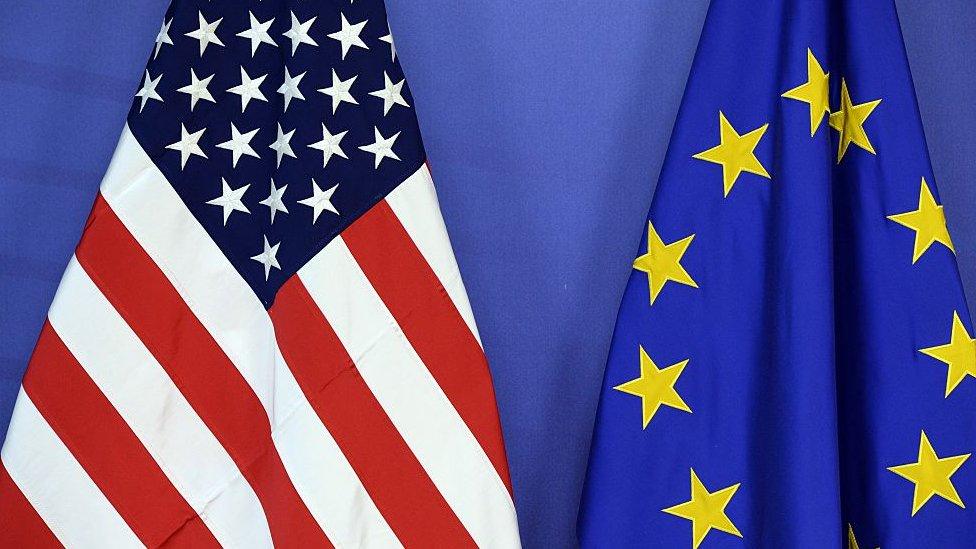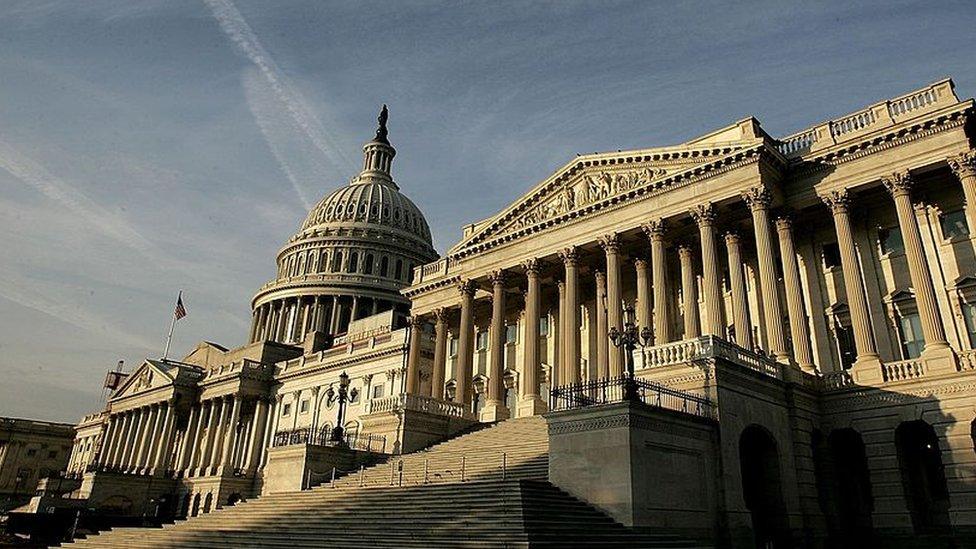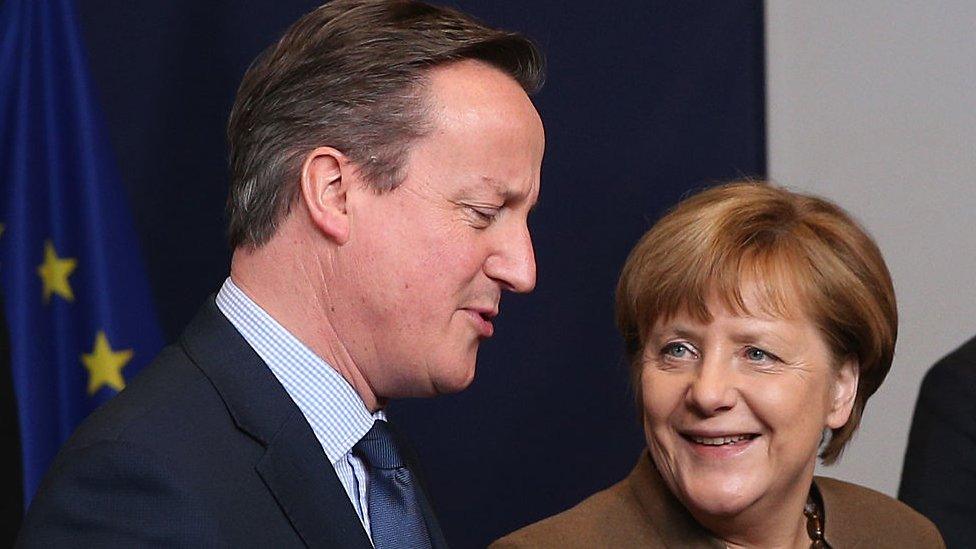EU referendum: How is the US (not) like the EU?
- Published

As the Brexit referendum debate approaches its day of judgement, many Americans have been left with a number of questions.
What is Brexit? What happens if the UK votes to leave? And, uh, what do the letters EU stand for again?
So here are some basics. The EU is the European Union. The people of the United Kingdom may - or may not- want to leave.
Like the US, the EU has a flag. They both have their own currencies. They control their external borders and their citizens have an unlimited right of movement within their internal borders. They regulate immigration.
And, perhaps, the forces that have led the UK to consider withdrawing from the EU could also be at play in the US.
No, seriously. Here are handful of ways the EU and the US are similar enough to merit such consideration, and a few reasons why they aren't.

How they're alike

A disliked bureaucratic elite? One is a distant, meddlesome, too-powerful government on the banks of the Potomac River. The other is a distant, meddlesome, too-powerful government on the banks of the Zenne (that's a river in Belgium).
While Washington and Brussels may not have much in common geographically or culturally, they are united in the derision often directed their way.
The governments in Washington and Brussels have sweeping powers to issue regulations on things like the environment, immigration, trade and commerce - which has led to resentment and distrust from those who view their power as illegitimate or overreaching.
US conservatives regularly campaign against Washington bureaucrats and big-government politicians who impose their legislative priorities on the states. While he was running for president last year, Wisconsin governor Scott Walker called the capital city area "68 square miles surrounded by reality".
Meanwhile Brussels is a "job-destroying machine" full of arrogant elites, according to pro-Brexit MP Michael Gove.
It's not easy being a political punching bag, but it's the burden both cities have to bear.
Separatist attitude. Both the US and the EU have their share of peoples with distinct regional identities that make playing nice with a strong central government a bit of a stretch.
Everyone by now is familiar with Brexit. But what about Texit?
Residents of the US state of Texas have always had a bit of attitude and an independent streak - it probably comes from flying their own flag for nine years after winning independence from Mexico.
Although they gladly joined the US back in 1845 in exchange for relief from war debt, there are some in the Lone Star State who, like the pro-Brexit crowd, think it's time to go it alone once again.
The Guardian recently spoke, external with some Texans who think a UK withdrawal from the EU would serve as a shining example for their state and could lead to greater interest in a Texas secession referendum.
"At a cultural and spiritual level there are a lot of similarities," Daniel Miller of the Texas independence movement told the Guardian.
"A fiercely independent spirit. Keep calm and carry on. The stoicism. There's a sense that when you're pushed, you don't just crumple like yesterday's newspaper, you stand up for what you believe in. We are easygoing, we are friendly, but when our core values and principles are threatened, we don't take kindly to it."
Givers and Takers. One central feature of both the EU and the US is that burden of the central government is born unequally by member states.
For every Germany or France that carries a heavy load, there's a Greece or a Portugal that has a lighter share.
In 2015 Germany, France, Italy and the UK combined to account for, external 60% of all contributions to the EU budget. Hungary, by comparison, only covered 0.77%.
In the US, states like New Jersey and California send more money, external to the US coffers than they get in return, while South Carolina and New Mexico are on the receiving end of federal largess.
For every dollar paid in federal taxes, Mississippi receives $4.70 back from the federal government. Tiny Delaware, on the other hand, only sees 50 cents of every dollar it sends to Washington, DC.

How they're different

Givers and takers (part two). OK, so Germany doesn't exactly shoulder the burden for Greece the way California does for Mississippi - and that's because the social safety net in the US is cohesive in a way that it isn't in Europe, where each country has its own system.
In the US Social Security retirement benefits for its citizens are the same whether they live in Kansas or Florida. Qualifications for Medicaid health benefits and other aid for the poor are roughly similar and shouldered in large part by the federal government.
"German citizens don't really see why they should fund the early retirement of Greeks, and Greeks don't really see why Germans should set tax and labour market rules in their country," writes, external the Weekly Standard's Irwin Stelzer.
"Texas oil workers might not want to support California surfers, but they are barely aware they are doing it."
In a way, the EU is more like the US under the pre-Constitution Articles of Confederation - a weak central government in which the former colonies of differing strength jockeyed for power under the constant threat of financial ruin.
Out of that bungled political mess the US emerged as a cohesive state. It might have turned out differently if, say, Virginia had decided to go its own way, however.
A state without a head. As the US engages in its quadrennial marathon to elect a new president, it's worth noting that the EU for all its attempts to be a cohesive governmental unit, lacks the one thing that really defines a state - a true leader.
It does have Jean-Claude Juncker, head of the EU Commission. But ask a European who the head of the US is, and chances are you'll usually get a correct response. Ask an American who runs the EU, and you'll get a blank stare 99.9% of the time.
It's much easier to break the "bonds of affection" between the people of a nation, in the words of Abraham Lincoln, if there's no Lincoln out there telling the world how important those bonds are.
Civil disagreement. Speaking of Lincoln, remember the last time some parts of the US voted to leave their union? It started with a bunch of speeches and politicking and ended with 750,000 war dead in a brutal US Civil War.
The legality of a British withdrawal from the EU is unquestioned, while the possibility of secession was hotly debated in the US in the mid-Nineteenth Century and ultimately settled by force of arms.
While analysts differ on the consequences of a Brexit "yes" vote and the difficulty of disentangling from decades of EU membership, one of the results will not be EU warships shelling British coastal fortifications or the blue and gold banner carried into battle on some field in Kent.
- Published30 December 2020

- Published22 June 2016

